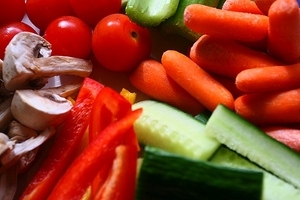
Medications aren’t the only way to treat those suffering from mood disorders, anxiety, and Attention Deficit Disorder, according to Dr. Robert Hedaya, a Chevy Chase-based psychiatrist.
A change in one’s diet to include various vitamins, minerals, and amino acids can help in the production of certain neurotransmitters that are vital for mental health, Hedaya said at a recent BB&R Consulting health conference held at Georgetown University. But these days, he said, the go-to solution for mental health problems is to medicate with antidepressants.
In fact, 40 to 60 percent of people treated for depression don’t respond to prescribed antidepressants, according to a 2007 study. That was the case for a 10-year-old girl suffering from bipolar disorder. When she first met with Hedaya, she was already on four different medications. Hedaya and his team at Whole Psychiatry changed her diet and increased her vitamin intake. Twelve years since their first meeting, the girl no longer relies on medicine to control her disorder.
In another case study, a 50-year-old woman came to Hedaya complaining of regular panic attacks. Her test results showed that she was deficient in vitamin B12. Hedaya upped her B12 vitamin intake, and her panic attacks soon faded away.
“What happens in your gut affects your brain,” Hedaya said. “Your meal can affect your body’s systems.”
While these patients’ treatments were successful, every person’s case is unique. Hedaya’s treatment methods at Whole Psychiatry involve a healthy dose of both supplements, vitamins, diet and lifestyle changes, and medication—when deemed necessary.
Here are nine amino acids, vitamins, and minerals needed in one’s diet to ensure the production of neurotransmitters—chemicals that send messages between different brain cells. Neurotransmitters like serotonin, melatonin, norepinephrine, epinephrine, and dopamine play roles in one’s mood, appetite, anxiety, sleep, and other psychological and physical reactions in the body. To learn more about neurotransmitters and how they work, click here.
1. TRYPTOPHAN
- What is it? An essential amino acid that the body does not produce. It’s needed for normal growth in infants and for nitrogen balance in adults.
- How can I get it? Cheese, chicken, eggs, fish, milk, nuts, peanut butter, peanuts, pumpkin seeds, sesame seeds, soy, tofu, and turkey.
- What will it give me? Serotonin.
2. TYROSINE
- What is it? A nonessential amino acid that helps organs responsible for making and regulating hormones.
- How can I get it? Soy products, chicken, turkey, fish, peanuts, almonds, avocados, bananas, milk, cheese, yogurt, cottage cheese, lima beans, and pumpkin and sesame seeds.
- What will it give me? Dopamine, epinephrine, and norepinephrine.
3. ZINC
- What is it? An essential mineral that the body does not produce. It plays a role in immune functionality, wound healing, normal growth and development during pregnancy. It is required for a sense of taste and smell.
- How can I get it? Oysters contain the most zinc than any other found, but it can also be found in red meat, beans, nuts, seafood, whole grains, fortified cereals, and dairy.
- What will it give me? Serotonin.
4. MAGNESIUM
- What is it? It’s the fourth most abundant mineral in the body excreted through the kidneys, and is needed for hundreds biochemical reactions in the body. It helps maintain muscle and nerve function, heart rhythm, the immune system, and keep bones strong.
- How can I get it? Legumes, nuts, whole grains, and vegetables.
- What will it give me? Serotonin and dopamine.
5. COPPER
- What is it? A mineral that is necessary for growth, development, and maintenance of various body organs, including the brain and heart. It helps with production of red blood cells and absorption of iron.
- How can I get it? Seafood, liver, whole grains, nuts, raisins, kale, beans, and mushrooms.
- What will it give me? Dopamine.
6. IRON
- What is it? An essential mineral that is needed for the production and performance of the hemoglobin.
- How can I get it? Meat, spinach, beans, fortified cereal, and oysters.
- What will it give me? Serotonin and dopamine.
7. B6
- What is it? A group of compounds resulting in this vitamin that helps with various biochemical reactions in the body, including the breakdown of proteins and production of red blood cells.
- How can I get it? Potatoes, bananas, beans, seeds, nuts, red meat, fish, eggs, spinach, and fortified cereals.
- What will it give me? Serotonin, norepinephrine, melatonin, and dopamine.
8. B12
- What is it? A vitamin that plays a role in protein and DNA synthesis. Hydrochloric acid in the stomach releases B12 from protein during digestion and it is then absorbed into the bloodstream.
- How can I get it? Fish, shellfish, red meat, eggs, and dairy products.
- What will it give me? Efficient amounts of B12 will prevent serious conditions like anemia, nerve damage, and peripheral neuropathy from occurring.
9. FOLIC ACID
- What is it? A vitamin needed to produce red blood cells.
- How can I get it? Liver, fruit, leafy greens, orange juice, and food prepared from dried yeast.
- What will it give me? Serotonin and dopamine.


















